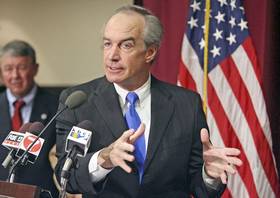forum
library
tutorial
contact

Kempthorne Lends an Ear
to Idahoans' Conservation Views
by Rocky Barker
Idaho Statesman, October 10, 2006
|
the film forum library tutorial contact |

|
Kempthorne Lends an Ear
by Rocky Barker
|
 Interior Secretary Dirk Kempthorne came back to Idaho on Monday not to talk but to listen.
Interior Secretary Dirk Kempthorne came back to Idaho on Monday not to talk but to listen.
More than 90 people came to Boise State University's Student Union for Kempthorne's 26th and final "listening session" aimed at hearing ideas about how the government can best aid cooperative conservation programs. Critics of the Endangered Species Act dominated the sessions.
But other people came simply to express their views on a wide range of subjects, from a gold mine proposed near Atlanta to forest fires.
As a U.S. senator, Kempthorne tried but failed to reform the Endangered Species Act, which requires the federal government to keep all species from going extinct. He was Idaho's governor until May, when he became interior secretary.
Critics of the law urged Kempthorne as well as U.S. Sens. Larry Craig and Mike Crapo, both Idaho Republicans, to push for reforms that make the act less restrictive, give states more control and make it easier on landowners who want to voluntarily protect habitat.
But Jim Caswell, whom Kempthorne appointed as director of the state Office of Species Conservation while governor, said Idaho can help itself by getting involved in protecting species before they near extinction and qualify for endangered species protection.
"We need to start playing the game at the beginning instead of in the fourth quarter," Caswell said.
Caswell, who now serves for Gov. Jim Risch, is working with Idaho lawmakers to develop a "rare and declining species" law in Idaho that would:
Reforming the law to give states more involvement in endangered species policy, as Crapo proposed in a bill introduced earlier this year, would help, Caswell said. Bureaucracy makes developing conservation plans "painfully slow," he said.
"It shouldn't be painful to do good things for wildlife," Caswell said. The Endangered Species Act is not responsible for a lack of cooperation on all issues, said Bill Sedivy, executive director of Idaho Rivers United.
The federal government has refused to acknowledge that Idaho's salmon are even in trouble, he said. "I submit that our problems stem from a lack of federal leadership," Sedivy said.
Will Whelan of the Nature Conservancy of Idaho said the federal government would encourage cooperation by supporting the goals of others willing to work together rather than by pushing its own goals.
"It's not easy work," Whelan said. "If it's not keeping you up at night, it's not working." Ted Hoffman, an Owyhee County rancher, had a similar message.
But he went further, urging agencies to back away from management by regulation alone. "If the feds want cooperation, all they have to do is start cooperating," Hoffman said.
The Bush administration came into the sessions with no conclusion on how it should proceed, Kempthorne said. Officials wanted to hear from all sides, he said.
"We may have people with different views and different perspectives," he said. "That's what we need."
learn more on topics covered in the film
see the video
read the script
learn the songs
discussion forum
